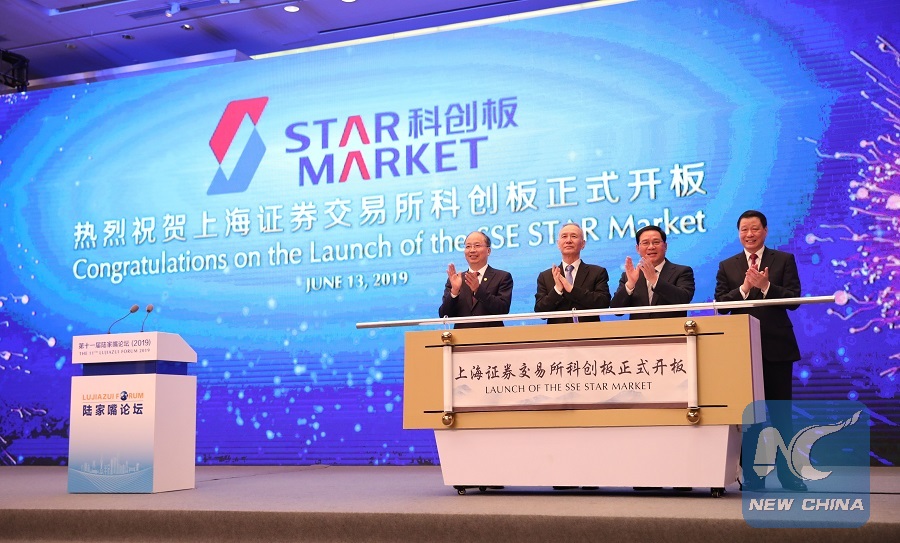
Honored guests preside over the launching ceremony of the sci-tech innovation board of the Shanghai Stock Exchange at the Lujiazui Forum in Shanghai, east China, June 13, 2019. (Xinhua/Fang Zhe)
LONDON, June 25 (Xinhua) -- The opening of the new sci-tech innovation board on China's premier stock exchange was the latest in a series of milestones in the opening up and reform of China's capital markets, a senior economist at a London-based economic think-tank told Xinhua in a recent interview.
China inaugurated its Science and Technology Innovation Board (STIB) earlier this month in Shanghai, beginning the country's much-anticipated capital market reform this year.
"This program is based on China's proposal of several years ago, and also aims to improve and enhance the Chinese capital market position in the world," Mao Xuxin, principal economist at the National Institute of Economic and Social Research (NIESR) said.
STIB was unveiled at the first China International Import Expo in Shanghai in November last year, and launched on the Shanghai Stock Exchange (SSE) this month as a new board which will use a registration-based system for listed companies.
"From the international perspective, it is very important to establish, for example, Shanghai as an international financial center," Mao told Xinhua.
"At the same time...to fulfill the local demands of financial investors in new start-ups and companies, and...to provide better opportunities for the local and global investors to invest and benefit from the technology and science developments of China," Mao said.
ANOTHER MILESTONE
Mao placed STIB as the latest in a long line of milestones achieved by China in its opening up and reform of its capital markets.
Beginning with the opening of the SSE in 1990, China has pursued a policy of loosening controls on capital markets and extending its opening up policies to more and more nations and foreign investors, said Mao.
Mao referenced the Qualified Foreign Institutional Investor (QFII) program launched in 2002 which allowed registered and approved foreign institutions to invest in stock markets in Shanghai and Shenzhen for the first time.
This was followed by the RMB Qualified Foreign Institutional Investor (RQFII) in 2011, as mechanisms for foreign capital and foreign investors to access China's markets.
Mao described these as milestones for capital inflows to China.
In addition, the creation of the Shanghai-Hong Kong Stock Connect in 2014 allowed share trading using capital from both locations, said Mao, and the creation of the Shanghai-London Stock Connect earlier this month inaugurates the start of a new channel for trading in stocks both in and out of China's mainland.
"Both STIB and Shanghai-London Stock Connect were launched earlier this month, which means that reform and opening up has been sped up," said Mao.
MARKET REFORM
Mao regarded STIB as part of the opening up and reform process of China's capital market.
Mao said: "In general we can use several examples to conclude the general direction. First, more loose control of capital so that investors both domestic and overseas can invest in the capital markets.
"Second, (it represents) more transparency to the process and investment procedures. So as you can see when ever the opening up process takes place there will be more and more transparent information published than before the launch process."
Mao added: "Third, starting from 2002 when the QFII was launched it was in the region of several billion U.S. dollars but nowadays you can see in STIB and Shanghai-London Stock Connect, they are of much larger scope and much larger trading volumes are going to be generated.
"At least three parts of the story are going to define the process, and the fourth one is made by the general process of reform and opening up -- China has opened up to more and more countries and regions."
Mao said that previously the scope was "narrowed down into the domestic market or specific markets", but nowadays China was aspiring to reach not just the local market but was "aiming for the worldwide market access to that Chinese capital market and its financial center especially Shanghai to be internationally orientated and opened up for the future challenge".
BOOST FOR TECH FIRMS
The tech sector had contributed to China's economic growth and STIB will allow a further stimulus to Chinese firms, Mao said, with examples now internationally known such as Alibaba, Tencent, and Baidu.
"Chinese entrepreneurs and the start-up companies... have contributed a lot in several areas and they are counting up great potential to be listed companies. And these companies are in need of great financial support and if the domestic market cannot provide that support for future expansion, they have to look overseas for example the London or New York market.
Mao said that for this reason it was "very important for Chinese policymakers to find a good channel to cope with the demand, and at the same time to let not only Chinese investors but also international investors benefit from the listing opportunities of newcomers in the financial innovation front."
STIB will give a new generation of Chinese tech companies an opportunity to source the capital they need from an international pool and at the same time allow foreign investors to benefit from the skills and success of Chinese firms.
"The launch of STIB is going to be a good opportunity for Chinese companies to enjoy the same opportunity as they could enjoy by being listed overseas so that they can get the best support, the best global reach from not only local but also global investors," Mao said.

